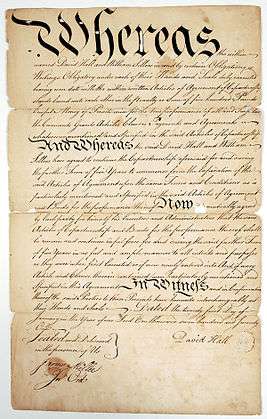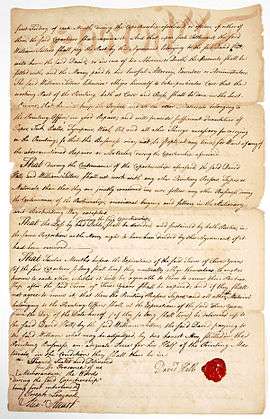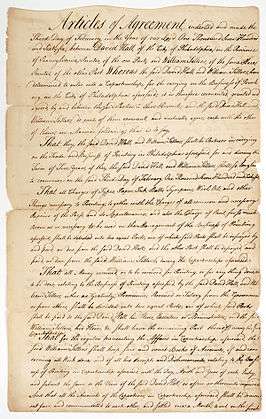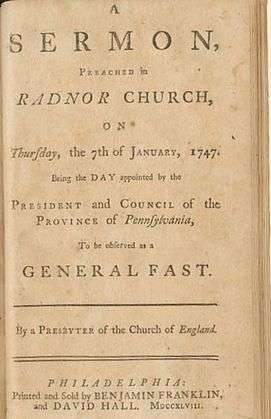David Hall (publisher)
David Hall (1714 – December 24, 1772) was an American printer and a business partner with Benjamin Franklin in Philadelphia. He took over Franklin's printing business and that of publishing the Pennsylvania Gazette newspaper that Franklin had started. Hall formed his own printing firm in 1766 and did publishing for the government and printing of paper money.
-Pennsylvania-18_Jun_1764.jpg)
Early life
Hall was born in 1714 in Westfield near Edinburgh, Scotland. His father was James Hall.[1]
Career
Hall was apprenticed in 1729 for five years at the age of 15 to a printing firm in Scotland run by John Mosman and William Brown.[2] Hall's friend William Strahan sent a letter to lawyer James Read of Philadelphia in January 1743 inquiring about opportunities for printers in the American colonies.[3] Strahan first recommended Hall to his wife's cousin and described him as an honest hard working person.[3] Read presented the letter to Benjamin Franklin,[3] who needed a journeyman printer.[4] Franklin sent back a letter to Strahan on July 10 inviting Hall to come to Philadelphia for a job interview. In the letter Franklin said that if Hall didn't ultimately like the position offered, he would pay his expenses back to England. Franklin offered Hall 12 months of Good Work for the trouble of coming from England and trying the journeyman printer position.[5] Hall accepted the offer and came to Philadelphia on June 19, 1744.[2]
Hall adapted well to his new career and learned the skills of the printing trade. He became a professional in the eighteenth-century printing business which Franklin developed throughout Colonial America. Hall became very involved as a major participant in the printing business when he started working for Franklin in 1744.[4][6] He became the foreman of Franklin's shop in 1746 and did all the editing and publishing of the Pennsylvania Gazette newspaper that Franklin started.[2] Franklin considered semiretirement in 1747, since Hall was an active partner.[3] He made Hall an official partner on an eighteen-year contract in 1748 and went on to other interests for his full retirement.[7][8][9] The printing business became known as the Franklin and Hall firm.[1][10]
Franklin completed the sale of his share of the printing business to Hall in February 1766.[2] William Sellers became a journeyman printer for Hall and was a skillful printer. In May 1766 Hall made Sellers a partner in his business. The new firm of Hall and Sellers printed all of the official documents for the government of the Province of Pennsylvania, including its paper money. Hall also had a book store connected to the printing shop that sold books and stationary that he produced.[2]
Personal
Hall married Mary Leacock (Laycock) on January 7, 1748 at Christ Church in Philadelphia. They had four children.[1]
Memberships
Hall was a member of the St. Andrews Society and printed its documents. Hall was a member of the Union Library Company that later became part of the Library Company of Philadelphia. In 1762 he was Master of a Mason lodge in Philadelphia.[2]
The American Philosophical Society made Hall a member on March 8, 1768. He did not participate except in 1771 when he was a member of a committee to set a selling price for its publication of its transactions, which he published.[2]
Contributions
Hall was a contributor to the Pennsylvania Hospital, the College of Philadelphia, the Philadelphia Contributorship fire insurance company,[11] and the Philadelphia Silk Society.[2]
Later life and death
Hall died on December 24, 1772, and is buried at Christ Church cemetery in Philadelphia.[1]
Works
Example works printed by Hall.
 David Hall+William Sellers partnership contract terms
David Hall+William Sellers partnership contract terms Hall + Sellers partnership contract (page 2 of partnership terms)
Hall + Sellers partnership contract (page 2 of partnership terms) Contract extending Sellers-Hall partnership for 5 more years
Contract extending Sellers-Hall partnership for 5 more years Sermon preached in 1747
Sermon preached in 1747
published by Hall in 1748
References
- Spencer 2012, p. 503.
- Kany, Robert Hurd (1963). "David Hall: Printing partner of Benjamin Franklin". Manuscripts. American Philosophical Society. Retrieved April 29, 2016.
In February 1766 Franklin sold his share in the business to Hall.
- Waldstreicher 2005, p. 123.
- Morgan 2008, p. 110.
- "From Benjamin Franklin to William Strahan, 10 July 1743". Founders Online. National Archives. Retrieved January 4, 2020.
If the young Man will venture over hither, that I may see and be acquainted with him, we can treat about the Affair, and I make no doubt but he will think my Proposals reasonable; If we should not agree, I promise him however a Twelvemonths Good Work, and to defray his Passage back if he enclines to return to England. I am Sir, Your humble Servant unknown B Franklin
- Lippincott 1917, p. 272.
- Donovan 1962, p. 47.
- Morgan 2008, p. 25.
- Doren 1945, p. 55.
- Lemay 2014, p. 81.
- Morgan 2008, p. 58.
Sources
- Donovan, Frank Robert (1962). The Benjamin Franklin papers. Dodd, Mead.CS1 maint: ref=harv (link)
- Doren, Carl Van (1945). Benjamin Franklin's Autobiographical Writings. Viking Press.CS1 maint: ref=harv (link)
- Lemay, J.A. Leo (1 October 2014). Benjamin Franklin, Vol. 3. University of Pennsylvania Press. ISBN 978-0-8122-9141-4.CS1 maint: ref=harv (link)
- Lippincott, Horace Mather (1917). Early Philadelphia: Its People, Life and Progress. J. B. Lippincott Company. p. 272.
In 1748 Franklin relinquished his active interest and David Hall, for four years in his employ, was made the active partner under the firm name of Franklin and Hall, Hall agreeing to pay Franklin £1000 for 18 years, which was equivalent to $2660 a year. David Hall was reared as a printer in Edinburgh and entered Franklin's employ in 1744.
CS1 maint: ref=harv (link) - Morgan, Edmund S. (3 November 2008). Benjamin Franklin. Paw Prints. ISBN 978-1-4395-6887-3.CS1 maint: ref=harv (link)
- Spencer, Mark G. (27 December 2012). Encyclopedia American Enlightenment. Continuum. ISBN 978-0-8264-7969-3.CS1 maint: ref=harv (link)
- Waldstreicher, David (10 August 2005). Runaway America: Benjamin Franklin, Slavery, and the American Revolution. Farrar, Straus and Giroux. ISBN 978-0-8090-8315-2.CS1 maint: ref=harv (link)